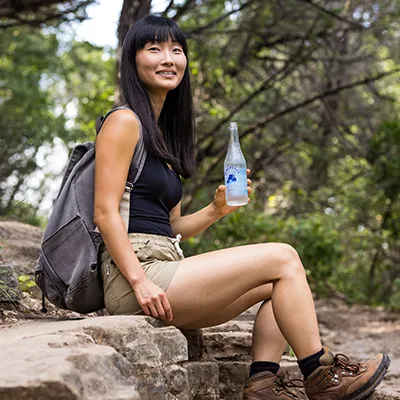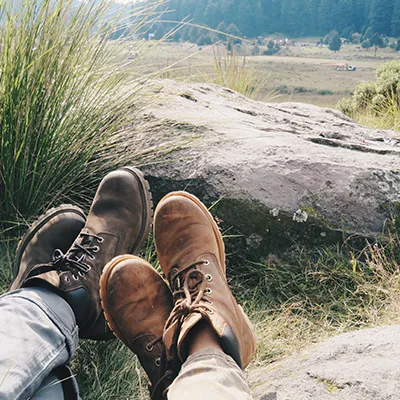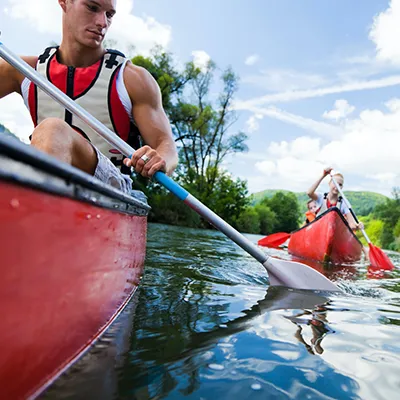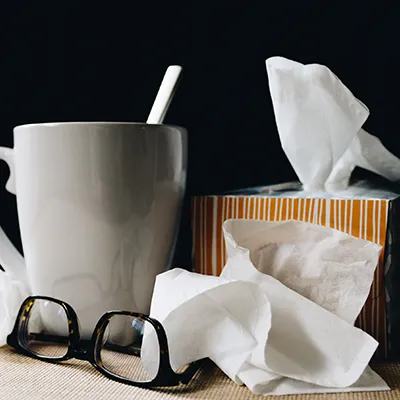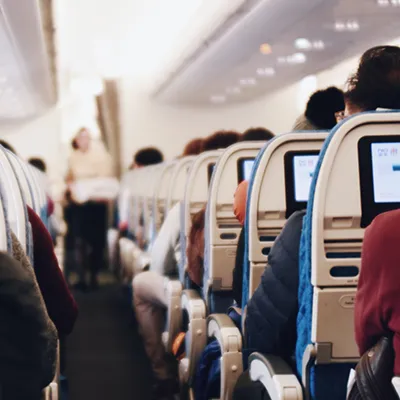Just because you go on holiday doesn’t mean you have to — or should — abandon all the healthy habits you’ve developed at home. Nothing ruins a vacation quite like getting sick or hurt during your trip. These tips for staying healthy while traveling will help you make the most of your time away and, hopefully, keep you from having to use travel insurance in an emergency.
How to Stay Healthy While Traveling
1. Eat well.
How to eat healthy while traveling is top of mind for a lot of us. We tend to have less control over our meals when we’re on the road, not to mention the temptation of new and decadent foods can be great.
First and foremost, remember that it’s 100% acceptable to indulge while on vacation. You don’t have to go overboard, but treating yourself to a meal that you’ll never be able to find at home is encouraged. Experiencing a place through local flavors is part of the adventure, and you should absolutely take advantage of the opportunity.
Create a meal itinerary the same way you plan your hotels and activities.
“Making a plan will ensure that you can both enjoy treats and indulgences but also maintain your current healthy habits,” says Julie Przybyla, St. Louis-based registered dietician, certified personal trainer, and owner of Vibrant Nutrition & Fitness. “Research your destination and plan the meals that will be a treat. Then, fill in the gaps with healthier options that are already part of your nutrition. Your digestive tract with thank you for the consistency of familiar foods in between the treats.”
Pack your own snacks if you’re going to be out exploring all day. “Airports and restaurants are notorious for hidden calories and unhealthy foods,” Scott and Collette Stohler of Roamaroo.com told us. “Protein bars like Quest Bars or Jay Robb are perfect, lightweight additions to your luggage and your waistline.”
Focus on portable, hunger-satisfying foods like nuts and fruit. By bringing your own, you’ll also save money while traveling.
How can I eat healthy on vacation in a hotel?
Even if there’s a kitchen in the vacation home you rented, you’ll probably dine out more when you travel. This can make it more challenging to eat healthy on vacation.
Restaurants and hotels, especially in the United States, are notorious for serving huge portions. Ask if you can get a half-portion or look on the menu for “lighter” options, which are often smaller servings of other menu items.
“These items often are leaner cuts of meat served with more non-starchy vegetables, like broccoli, asparagus, and squash,” says Julie. “Explore these menu items as you might find a new favorite.”
It is possible to eat out and still eat healthy. Like Julie said earlier, it all goes back to making a simple strategy before you even leave home.
“Again, it is okay to have more indulgent meals. But if you’d rather stay on the lighter side, aim to fill up with veggies first,” she recommends. “Have a salad prior and water. When ordering, look for items that are paired with lots of veggies other than potatoes. When your plate comes, eat those first, then the other items like the meats and starches.”
Is it okay to eat street food when traveling?
To say that you should never eat street food, especially if you’re traveling internationally, isn’t realistic. Some of the most delicious treats I’ve ever had came from stands on the side of the road (I’m thinking of you, empanada from a random hut along a Chilean highway).
Instead of avoiding street food altogether, be smart about which ones you try. Seven Corners writer Luke Armstrong shares his top tips, gathered from over 10 years of traveling through more than 30 countries:
- Don't eat street food if there are young children in the food stall. Those hands go straight from their diapers to guess where?
- Avoid lettuce, uncooked cabbage, strawberries, and other produce that grows close to the ground where livestock waste tends to wash through with the rain.
- Foods that you cook or peel — bananas, oranges, grapefruit — are often safer than those you eat raw or with the outer flesh still on.
- Take note of the condition of the food in the stall. Does it look fresh and inviting? Does it look like it's been on the grill all day? Is there a steady flow of traffic through the stall, or does it seem stagnant?
- When in doubt, ask them to cook your food longer or just avoid it and find your next meal elsewhere.
Says Julie: “It also helps to pack some anti-diarrheal meds just in case the food doesn’t like you as much as you like it.”
Finally, writer Carla Janette recommends taking probiotics when you travel. “Probiotics help you maintain a healthy gut by increasing the good bacteria in your belly so you can fight off the bad bacteria. They help you maintain healthy bowel movements and fight off microbes and parasites that can be commonly found.”
Probiotics can be found in capsule form from your local pharmacy as well as naturally in some foods like yogurt.
How do you travel with food allergies?
Trying new foods, especially when you aren’t sure what ingredients are in an unfamiliar dish, can make travel a challenge for those with food allergies and sensitivities. It’s not impossible, though.
UK-based writer Nikki Vivian recommends contacting restaurants ahead of time if you can. Ask them about options for customizing dishes and avoiding cross-contamination. You’ll likely find that many places are happy to accommodate your requests, especially if they come in advance.
Another option: “Think about grocery delivery to your vacation rental,” says Nikki. “If you have a food prep area, it may make sense to have items delivered so you can have a few meals and snacks that are familiar and allergy-safe.”
Find more ways to travel safely with food allergies.
2. Drink well.
Staying hydrated is just as important as eating well, if not more than. If you don’t get enough water, you’ll likely experience fatigue, headaches, irritability, and even more severe symptoms like fever. You don’t want any of these things interrupting your vacation.
Carry water with you while you explore or make sure you have a steady supply while you’re relaxing on the beach. You can also get water from some foods, such as watermelon and other fruits, lettuce, cucumbers, celery, spinach, and mushrooms.
If you’re in a tropical location, Luke recommends taking advantage of coconuts, which have similar electrolytes to what you find in Gatorade and, when unflavored, can be low in sugar and calories.
Should I drink the water?
At some destinations, it’s safer to drink bottled or treated water than what comes out of the tap. Check with the Centers for Disease Control and Prevention or local authorities if you’re unsure. It’s also a good idea to brush your teeth and rinse your toothbrush with bottled water at these destinations.
If you’re flying to another country where you can’t drink the water, I recommend filling up a reusable water bottle at the airport before you leave. That way you aren’t trying to get liquids through TSA security, but you’ll have something you can drink when you land. This has saved me more than once when I wasn’t able to get to a store for bottled water right away and needed something to drink for a jetlag headache.
We tend to think about safe drinking water only in less-developed countries, but these aren’t the only places where you should pay special care.
If you’re camping anywhere, regardless of the country, be cautious about drinking water from streams or rivers. These sometimes have bacteria from animal waste that can cause you extreme illness and even death.
Avoid drinking water from still or stagnant water. In both cases, it’s best to treat your water with purification tablets before drinking.
3. Sleep well.
Your everyday routine is different when you travel. Sometimes shaking up the ordinary is why we travel. It’s still a good idea to get good sleep, though.
When you’re well-rested, you’re able to stay more alert. This can help you make better decisions and be aware of your surroundings, both important things when you’re in an unfamiliar place. The less alert you are, the more likely you are to make a mistake that could put you in an unsafe situation.
Good sleep can also help improve your mood — nobody wants to be a Grumpy Gus on vacation — as well as reduce stress and keep your immune system working well.
How can I avoid jetlag?
Changing time zones can seriously mess up your sleep schedule, but there are ways to beat jetlag.
- Prepare your body for the new time zone before you travel. For a week or so before your departure, start cycling your routine around so that you’re going to bed earlier or waking up earlier (or both) so it’s not quite as strong a shock to the system at the start of your trip. The more time zones you’re changing, the more helpful this hack will be.
- Stay hydrated. Water will help combat some of the symptoms of jetlag, including headache and fatigue. It can be tempting to go for another cup of coffee when you feel sluggish, but water will help more.
- Forget about what time it is where you were, and be in the time where you are. In other words, if you’re arriving at night, do your best to stay awake on the plane so that when you arrive, you can sleep like everyone else in your new city.
- Go outside or open curtains in the daylight so your body understands when it's daytime.
- Avoid long naps. This will only cause jetlag to linger.
- Ask your doctor about melatonin supplements to help you ease into a good night of sleep in your new time zone.
4. Dress appropriately.
Remember when your mom said you had to wear a hat in the snow so you wouldn’t catch a cold. It’s the same idea when you travel. Dressing for the climate and weather conditions at your destination can help keep you healthy and comfortable.
Obviously, you’re going to choose lightweight, light-colored clothing for warmer climates, and heavier layers for cold. Remember that the weather at some locations can vary greatly throughout the day. Pack accordingly with an extra jacket for when the evening gets chillier, or a cap for when the sun comes out stronger at midday.
Going on a cruise? Weather conditions can change rapidly on a ship, so make sure you have everything you need with this essential packing list for your next cruise.
No matter where you’re going, don’t underestimate the value of a dry pair of shoes. “The best thing you can do is to pack waterproof shoes,” says Luke. “If you're going to be walking in a place where temperatures dip at dusk and dew accumulates, bring a dry pair of socks to change into. This will keep you both healthy and happy. Who doesn't love the feeling of slipping into a pair of clean socks after a day of walking about?”
5. Protect yourself from the sun.
Unless you’re going to spend your entire trip in a cave, this tip is for you. The sun can affect you whether you’re on the beach in the summer or on the ski slopes in wintertime.
Sunrays can be particularly strong at high altitudes, so the effect of the sun often surprises us when vacationing in the mountains. And if you’re on the water, say boating or eFoiling, it’s even more intense as the sunlight will also reflect off the water for a double dose of rays.
Wear sunscreen and be sure to lather up any parts of your body that are uncovered by clothing. Wear a hat with a brim and sunglasses to protect your face and eyes, which can be particularly sensitive to the sun.
UV clothing can help protect you from sunburn and windburn. Investing in a lightweight, long-sleeved shirt with UV protection is a good idea if you’re going to be on a boat or fishing.
6. Wear a mask
We’re all aware that wearing a face mask can help reduce the spread of illness. If you’re feeling sick or are traveling in an area with high contagion rates, it’s advisable to mask up. Why have your trip interrupted or delayed by a quarantine if you can avoid it?
This isn’t just for COVID, either. Wearing a mask can reduce the risk of other airborne illnesses such as the flu and common cold
7. Practice safe sex.
It’s common to let go a bit during vacation. Sometimes when we travel, we do things we normally would shy away from. By all means, live it up. Just remember that your actions still have consequences, and “what happens in Vegas” sometimes does actually follow you home.
A sexually transmitted disease is not the kind of souvenir you want, so practice safe sex. Our guest blogger Lawrence Ferber shared some of his favorite tips for gay travelers — pack your own condoms and lube — but anyone might find them helpful.
8. Play smart.
Should you exercise while on vacation? That depends on you and your fitness goals. A good rule of thumb, however, is to maintain at least a bit of your routine. If you typically do yoga three times a week, make sure you stretch in the morning or meditate before bed. If you’re all about cardio, enjoy an early run or walk before a day of sightseeing.
In our opinion, it’s best to stick with a routine that keeps you feeling happy and healthy, but don’t let your workout regime derail your vacation. Your body might appreciate the physical break and change of routine, but if your mental health calls for regular activity, stick with it.
If you’re looking for easy ideas to stay active on vacation, Scott and Collette suggest joining a walking tour, searching YouTube for workout videos, or dropping in at CrossFit or other chain gym. Bring your own workout videos and equipment, too, if you want.
“While you may not be able to fit a medicine ball or kettlebell in your carry-on, there is still plenty of fitness equipment that is lightweight and portable,” says Collette. “My personal favorites are TheraBands and a jump rope.
“Bands add lightweight resistance to any exercise including air squats, push-ups, and overhead presses. With a jump rope, you can use it inside or take it out into the great outdoors for a pumping cardio workout in just a few minutes a day.”
What adventure activities can I do on vacation?
It’s good to step outside your comfort zone when you travel. That’s how you discover new foods and meet interesting people. Trying new activities is part of that as well.
Whatever you choose to do — bicycling, surfing, canoeing — do it safely. Avoid activities that pose unnecessary risks and tour operators that don’t take adequate safety precautions.
You (hopefully) bought travel insurance before your trip, but it’s important to remember that you might not be covered for “adventure activities” such as jet skiing or bungee jumping unless you chose to add that coverage.
It can be harder to find medical attention if you do get hurt in a remote location or somewhere with a different healthcare system. With emergency travel assistance services like Seven Corners Assist, you have someone on-call 24/7 to help you find medical care and evacuate you to a new location if your current destination is unable to provide adequate treatment.
9. Pack required medications.
If you take regular medication, it’s important to make sure you have enough to last your entire trip, plus a bit more in case your return is delayed. It might be more difficult to find the same variety, brand, and dosage that you would get at home.
The same goes for some over-the-counter medications and medications that you don’t use frequently. Nikki reminds us about seasonal allergies: “When traveling, pollen levels are different than what you find at home and so are the local plants. This could affect your allergies.”
In addition to packing allergy medication, “Consider showering at night to avoid sleeping with pollen in your hair, which might aggravate your allergies. If you’re renting a house, ask if the HVAC filter can be changed before you arrive to further help avoid allergens.”
It may also be a good idea for your traveling companions to know when and how you need to use your medication. For example, if you have an EpiPen, does someone in your group know where it is and how to administer it?
Finally, make sure you pack copies of your medical records if traveling internationally with pharmaceutical drugs. Some border checkpoints might request official documentation that you’re carrying them legally.
10. Invest in travel insurance.
You don't need insurance to stay healthy but one of the most important things you can do for your health and wellness is to make sure you are covered in case of illness or injury while traveling.
This is particularly important if you’re traveling outside your home country. Your domestic health insurance often does not cover you on international trips, meaning you may have to pay for your medical care out of pocket.
Depending on the country, you might need to make that payment upfront before receiving treatment. Obviously, this can get expensive, not to mention stressful.
What about pre-existing conditions?
Some travel medical insurance does cover pre-existing medical conditions if you meet the plan’s requirements. This can vary by plan, so be sure to read the details carefully and talk to a licensed agent if you have any questions.
It’s also a good idea to talk to your doctor before your trip if you have any pre-existing conditions that could impact your ability to travel safely. “Discuss the best ways to manage your condition or find out if there are activities you should avoid,” says Nikki.
While you’re meeting with your doctor, that’s the perfect time to take address any preventive care, too. Travel medical insurance typically does not cover preventive care or regular checkups. Mark that off your to-do list before you leave, especially if you’re going to be traveling for a long time.
What do I do if I get sick while traveling in a foreign country?
With protection like Seven Corners Travel Medical Insurance, you get coverage for medical expenses when traveling internationally. You also get 24/7 emergency travel assistance services. Our Assist Team can help you find medical care in your location, recommend translation services if you don’t speak the same language as your doctor, arrange emergency medical evacuations, and more.
It can be overwhelming to navigate a foreign healthcare system, especially when you already aren’t feeling your best. Having access to travel assistance services like these can help.
It’s also a good idea to make a plan before your trip so you know the steps to take during a medical emergency.
- Know where your insurance cards are, and make sure your traveling companions know where they are, too. You might also download a digital copy to the Cloud. Do the same with your passport and other travel documents.
- Know what your travel insurance covers so you can take advantage of the necessary benefits. For example, does your plan have quarantine coverage? What about coverage for pre-existing conditions?
- Keep a list of emergency contacts with you. If you’re traveling with another person or group, designate one of those people as an emergency contact. Also name someone at home as an emergency contact.
- Decide how you’ll handle certain types of illness or injury. For something minor, you might simply contact your primary physician at home for a telemedicine appointment. But what will do you do if it’s something more severe than a cold or flu?
Make Travel Insurance Part of Your Healthy Plan.
Prioritizing your wellness, no matter where you are, is always a good decision. When purchasing travel insurance is part of that commitment to living a healthy life, contact Seven Corners. Try a quick quote online or chat with our licensed agents to find the right protection for your health and travels.
About the Authors
Several travel experts and writers contributed to this article. Becky Hart is the Content Marketing Strategist for Seven Corners. She regularly shares her travel expertise on the Seven Corners blog and, when not traveling or writing, is a certified cycling and strength training instructor.
Luke Maguire Armstrong is the author of The Nomad’s Nomad and a regular contributor to the Seven Corners blog. He has spent more than a decade traveling, writing, and funding philanthropic programs around the world.
Collette and Scott Stohler have been traveling full-time since 2015. Since ditching the desk job life, they’ve been committed to inspiring other families to travel. Collette is also the author of the book Passport to Fitness.
Nikki Vivian has more than 10 years’ experience writing for print and online publications, including The Guardian, Prospects, and several career websites to name a few.
Travel Like a Pro with The Wayfinder
Did you enjoy this blog? Get more articles like it before anyone else when you subscribe to our monthly newsletter, The Wayfinder.

